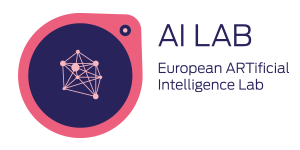Ars Electronica x Amnesty International
Machines can accomplish repetitive tasks with absolute precision. With recent advances in artificial intelligence, they are also gaining the ability to learn, improve and make autonomous decisions, in order to fulfill that were previously thought to depend exclusively on human expertise, creativity and intuition. This means algorithms, artificial intelligence, machines and robotics hold potential that interrogates our current understanding of humanity. What challenges and opportunities does this entail? How can artificial intelligence be used to protect and increase human rights? What are the responsibilities of industry, research, politics and civil societies? In cooperation with Amnesty International, this panel will address precisely these questions and discuss them with experts.
Moderation: Victoria Vesna
Speaker: Rasha Abdul-Rahim, Adam Harvey (US/DE), Nye Thomson (UK), Milena Marin (RO)
Video
Biographies

Adam Harvey (US/DE)
Adam Harvey (US/DE) is a researcher and artist based in Berlin focused on computer vision, privacy, and surveillance. He is a graduate of the Interactive Telecommunications Program at New York University (2010) and is currently a digital fellow at Weizenbaum Institut, a research fellow at Karlsruhe HfG, a future fellow with EYEBEAM’s Rapid Response for a Better Digital Future, and is the founder of the VFRAME computer vision project.

Milena Marin (RO)
Milena Marin is a Senior Advisor in Amnesty’s Evidence Lab, where she works on complex human rights investigations leveraging open-source information, data science and crowdsourcing.
Milena has over twelve years’ experience working at the intersection of technology, data and social good on issues like human rights, public sector transparency, anti-corruption and open data. She leads Amnesty Decoders, an innovative platform using data science, crowdsourcing and artificial intelligence to process and analyse large volumes of data such as documents, satellite images and pictures for human rights research. Previously she worked as programme manager of School of Data where she trained and mentored numerous NGOs and journalists around the world to make the most of their data and reach new audiences. She also worked for over 4 years with Transparency International where she supported TI’s global network to use technology in the fight against corruption.

Nye Thomson (UK)
Thompson creates software systems to explore technology paradigms and underlying power dynamics of the machine gaze. Shows include Tate Modern, Barbican, V&A, ZKM Karlsruhe & Ars Electronica. Collections include V&A. Her 1st solo show, described by C4 News as “too shocking to broadcast” triggered an international government complaint. Her work features in BBC, CNN, the Guardian & Wired. She’s been called “the new Big Brother” (Vogue) & “a contemporary Jacques Cousteau” (Bob & Roberta Smith).

Victoria Vesna
Director of the Art|Sci Center at the School of the Arts (North campus) and California NanoSystems Institute (CNSI) (South campus). Although she was trained early on as a painter (Faculty of Fine arts, University of Belgrade, 1984), her curious mind took her on an exploratory path that resulted in work can be defined as experimental creative research residing between disciplines and technologies. With her installations she investigates how communication technologies affect collective behavior and perceptions of identity shift in relation to scientific innovation (PhD, CAiiA_STAR, University of Wales, 2000). Her work involves long-term collaborations with composers, nano-scientists, neuroscientists, evolutionary biologists and she brings this experience to students.




